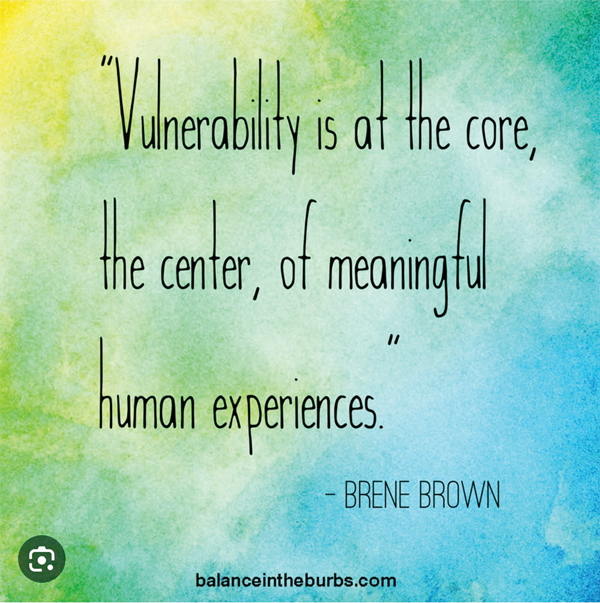
It all started with a simple question from a leader in the parking space: “If you’ve ever heard of Brene Brown, you may know about vulnerability in the workplace. What do you think that means?”
From every corner of the room, answers rang out: Vulnerability in the workplace means being conscientious around your staff. It means making sure people feel comfortable in a safe space. It means checking in with colleagues to ensure they’re okay…
I had a bit of a different angle to share, one that’s informed by my upbringing. I’m no workplace expert, but I do have two therapist parents and a sister who’s now a therapist, too—so for better or worse, I have something of a pseudo-psych degree. In our home, Brene Brown’s teachings have always been everyday table talk.
I stood up. “Brene Brown talks a lot about vulnerability,” I said. “But what many people don’t know is that she is actually a shame researcher.” The room went quiet as I explained that we all carry shame about who we are and what we feel and experience.
According to Brene, the one thing shame cannot withstand is vulnerability. So, when you bring shame to the office—”I’m not smart enough,” “I’m not successful enough,” “I’ll never achieve my goals”—you need space to be vulnerable or it will stick around. In too many workplaces, shame is flat-out censored, which ironically just expands it, so it keeps people stuck. If instead, you’re allowed that moment of vulnerability to express how you feel, the shame evaporates, and you can confidently move past it and achieve more.
Suddenly, there were so many hands waving in the air. Everyone had a story to share.
One woman recounted a time she brought a difficult situation to her boss, and he encouraged her to open up. Just the act of expressing her feelings defused her anxiety, and in fact, she felt so empowered that she went on to secure a customer that day.
Next, a man stood up and said, “I have the worst boss. One day, life was so hard that I cried at the office, and I was told ‘you can’t bring that here.’ That negative experience stifled me in so many ways.”
One after another, participants participated in vulnerable ways, and we all sat there rapt as each story was told. Afterwards, the room was buzzing. Most attendees had never turned their mind to the value of vulnerability at work, even though most of us had felt it firsthand.
For me, that turning point was a poignant one. As a vendor in the parking industry, I know that relationships are at the heart of our business. We meet with clients and get to know their needs, and we see each other on the road all the time. And yet, all we seem to talk about is how and when and why to park. What’s missing at work and at our conferences is the human element—how we really feel.
Brene Brown’s TED Talk “The Power of Vulnerability” has 20.7 million views on YouTube for good reason. In it, she defines vulnerability as “uncertainty, risk, and emotional exposure.” It’s that unstable feeling we get when we step out of our comfort zone or do something that forces us to loosen control. It’s what connects us as humans and helps us grow.
There’s a business upside to vulnerability, too. Not long ago, the idea of showing emotion on the job was viewed as inappropriate, or even mortifying. But today, the best leaders are not afraid to be vulnerable. On the contrary, they see opening up as a powerful motivator.
According to the Harvard Business Review, leaders who create space for vulnerability build psychologically safe work environments in which people feel welcome to be themselves. When we are willing to be authentic at work, we’re also more willing to take creative risks, share our perspectives without fear of consequence, and make valuable contributions that can only be expressed within a culture that values trust and inclusion.
So, what tangible strategies can we bring to our beloved parking industry to enhance vulnerability?
For starters, we can make room for ourselves and each other. The fact is, we are all psychological beings, and we bring our sh*t with us wherever we go—even to work. All of our triggers and feelings are part of who we are, so we need to be more open, accepting and compassionate, both with colleagues and with ourselves.
That doesn’t mean we should spill all of our secrets or dump our personal lives all over the place. It does mean it’s up to us to become more aware—and self-aware—around the office. Sometimes it’s just a matter of admitting you’re in a bad mood so no one takes you personally, or expressing that you’re embarrassed or angry, or not being afraid to knock on a colleague’s door to unload or lend an ear.
There is also a clear need for more ‘human interaction’ education in our industry, whether that’s face to face at conferences, or by webinars or Zoom sessions. People need an outlet to talk about what happens at work, where they spend so much of their time and effort.
The 1950s are over. These days, there are experts everywhere talking about emotional healing in the workplace. Inspired by the likes of Brene Brown, Jay Shetty, Adam Grant, and Simon Sinek, I say let’s keep the conversation going. Let’s give ourselves and each other the camaraderie and acceptance we all crave. Let’s open up, let’s be real, let’s express who we are so we can truly connect and bring our best selves to what we do every day. Our mental health demands it, and let’s face it, we deserve nothing less.
Kacey Siskind is proud to be Senior Vice President at HONK. She is proud to be the daughter of therapists who have taught her that sharing feelings is a strength. Kacey can be reached at kacey@honkmobile.com

















